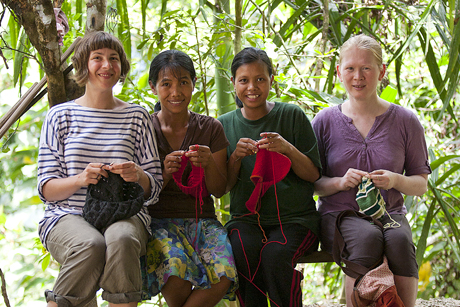Student knits Filipino women into skilled workers
By Scott Goldberg

When doctoral student Meredith Ramirez Talusan, M.A. ’11, went to Ifugao, Philippines, in 2011 to study the region’s rich poetic history for her research, little did she expect that by teaching a few local women to knit, her 10-day stay would birth a knitting social enterprise that employs 25 women and has produced more than 1,000 hats and scarves that sell around the world.
“It started with me teaching people how to knit without any specific goal,” Talusan said. The following summer, when she returned to Ifugao – which is among the 2,000-year-old rice terraces that were carved into the mountains by the indigenous people – to work on her research, “I arrived at 10 o’clock at night, and in the morning there were 12 women there ready to learn how to knit,” she says.
So Talusan started a knitting school in 2012 and founded the Ricefield Collective, which empowers indigenous women from the mountainous area by providing meaningful work through knitting, in April 2013 after a successful Kickstarter campaign. Kickstarter, based in New York City, is a funding platform for creative projects worldwide.
The Ricefield Collective pays some 25 knitters 1.5 to two times the local farm labor rate so the women can afford to stay on their land. In recent years, many women have been forced off their ancestral land because there was little work in the area.
Talusan, who is on a leave of absence from her doctoral comparative literature program, grew up on a family farm in the Philippines until age 15. She says that the collective specializes in high-quality hats and scarves that are sold to a global clientele.
At Cornell, the collective recruited graduate student Shoan Yin Cheung ’09 to serve as the operations intern and has teamed up with Ashoka U, a campus organization that catalyzes social innovation. “We’re doing a campaign with them called ‘Keep Your Hat on to Make a Difference,’ where we’re identifying social innovators in the Cornell community and photographing them with a hat that we designed specifically for the campaign.”
As part of the collective’s effort to engage members of the Cornell community with an interest in applying their skills toward social innovation, the collective’s website featured hip-hop producer Enongo Lumumba-Kasongo ’08, a doctoral student in the field of science and technology studies (sporting a red hat), who uses her music to spread positive messages to at-risk youth.
But Talusan’s vision goes beyond hats and scarves.
“Eventually, we would love to be able to work on community projects that benefit people outside the immediate community of our workers,” says Talusan. “We’re looking around and experimenting and then potentially something will grow into a bona fide part of the operation.”
“The combination of being able to use my unique skills and abilities while at the same time being able to affect economic change is the most rewarding aspect for me,” says Talusan, who was a featured speaker at the TEDx Cornell event Nov. 17.“I feel like I get the best of both worlds.”
In light of Typhoon Haiyan that killed more than 5,600 people in the Philippines in early November, the collective has also become involved in several relief projects, including running a toy drive, organizing a collective donation from the worldwide knitting community, and donating 10 percent of their own sales through Thanksgiving.
Scott Goldberg ’16 is a writer intern for the Cornell Chronicle.
Media Contact
Get Cornell news delivered right to your inbox.
Subscribe